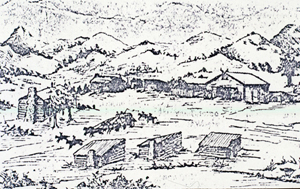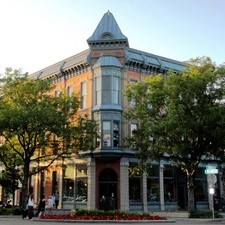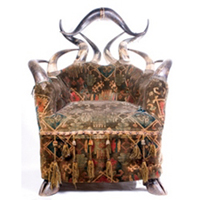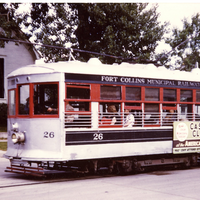News Flashbacks
How The Manhattan Stage Got There 73 Years Ago
by W. A. Berry
Fort Collins Coloradoan, February 9, 1962

It was cold that Wednesday night in early January of 1889 when the Manhattan stage rolled out of Fort Collins. Not too cold, just bracing cold about 18 above zero. Jim didn't mind it. As usual, he was up at 5 o'clock, fed and groomed his horses, ate a hearty breakfast of pancakes, eggs, bacon, oatmeal, biscuits and honey, and was at the post office early enough that he had his load and was ready to start promptly at 7 o'clock. Jim was only 17, but he was a husky lad, large for his age, and was accustomed to doing a man's work, such as running a star route for the post office department. On the day before this section had experienced one of those beautiful January snowstorms. It was one of those quiet fluffy snows-twelve inches deep which had settled down to ten inches. Mother Nature followed the snow with a drizzle, then dropped the temperature a notch or two to coat the snow with a gossamer-like sheet of ice, as though she would keep that moisture there for the native hay which made the beef which made the cattlemen independently wealthy. Also it would prevent the wind from taking the snow down into Kansas, thence, across the tip of Oklahoma to the Panhandle of Texas.
The snow with this covering of ice had a million diamonds in every square foot, made the going heavy for the bronchos. It was 11 o'clock before they got the stage to Owl Canyon, where the horses were changed, and it was 3 o'clock when they stopped at Livermore for dinner. (No it wasn't "lunch" in 1889, in Larimer County. The noon meal was defiantly "dinner," and the good folks at Livermore kept it piping hot for the driver too.) The next stop was at the Batterson ranch, where a new team of horses were hooked on. It was now getting along toward the end of the day. In the foothills of the Rocky Mountains there is no such thing as twilight; in about half an hour it is dark. From the Batterson ranch to Log Cabin it is 14 miles. But there was a light in the post office, a sandwich and a cup of hot coffee were waiting for the driver, and the team was given a breathing spell in the barn. (No, it wasn't the garage, it was a barn. The automobile hadn't been invented, although it was still in the pupa stage.)
There is one thing to be said for billboards: when the snow is so deep it covers the fence posts, at least one can tell where the road is by the information about where to go and what to see and what to eat and where to eat it-and where you can perform that new and fascinating and almost impossible feat-borrow some money-posted on structures of various designs one after another all facing the same way. But that interesting, though now some-what controversial, method of advertising had not invaded that section in 1889. Neither were there any fences between Log Cabin and Manhattan. Building corrals was the only reason for fence building in that high country at that time. When snow covered the ground you just had to know where the road was. The clocks were crowding mid-night when Jim pulled out of Log Cabin and headed across the tableland to Manhattan. The country up there is scantily forested. Probably it had been denuded by a forest fire. Anyway, many of the trees were small, some barely sticking out of the snow. The moon was in the last quarter, so there was enough light for one to see the road, if the road had been visible. But that beautiful snow blanket effectively hid every man-made mark. Jim knew the road (no it wasn't a highway; you're too young; to you there are only highways between here and yonder, but in 1889 it was a road). But he was cold, tired and a little sleepy. As he was going up one of those gentle inclines he missed a little turn. The team stopped. He straightened up, tightened up the lines a wee bit, and said, "Come on little doggies, let's get out of here." The horses responded, but nothing happened.
After several repeats of this dialogue Jim realized that something was wrong. He investigated, found that he was off the road and the stage was a-straddle a small pine tree, with the hind axle caught on a limb. Now the trees, even the little ones, which grow at that elevation are tough-they have to be to live. The stage was stuck-much like a boat on a sandbar. The horses were tired and discouraged. Jim was a bit discouraged, too. But "a little thing like that" was, after all, a small matter in Jim's life. He shoveled away some of the snow, got a firm hold on the reins and asked the team to "back up" a bit, then gave them the go sign. As they eased into the collars he bodily lifted that stage over the pine tree. They were on their way to Manhattan. He had dropped at Livermore the mail sacks for that office and for St. Cloud. He had dropped the mail sack for Log Cabin, the mail sack for Bush at that bush (There was also a house there.) He still had mail for Manhattan and Home; and the mail must go through, as President Grover Cleveland said when the strikers against the Pullman Co. held up a mail train in Chicago. (The mail from Home was taken from Manhattan by one of the Zimmerman girls on horseback).
Not that Jim was a Paul Bunyan. No such intimation is intended. The Manhattan Stage was not one of those fancy and cumbrous affairs made famous by stories of the Overlook Trail, which required four-team horse teams. Not at all. The Manhattan Stage was a medium-heavy spring wagon. Two horses could handle it nicely, and a husky lad like Jim was capable of lifting the back end of it (although it is admitted that some men would not have attempted to do it). About 2 o'clock Thursday morning Jim knocked at the door of the post office in Manhattan (they had given up waiting for him), delivered the two small mail sacks, got his receipt, saw that his horses got a good feed and a good bed, asked the postmaster's wife to fix him a cup of warm milk (she added a ham sandwich), got into a warm bed, and at 7 o'clock that morning was ready to make the return trip to Fort Collins. Jim's other name was J. F. Vandewark. (Now 91, he lives at 218 South Grant Street).


Preserving the history of Fort Collins, Colorado & the Cache la Poudre region





